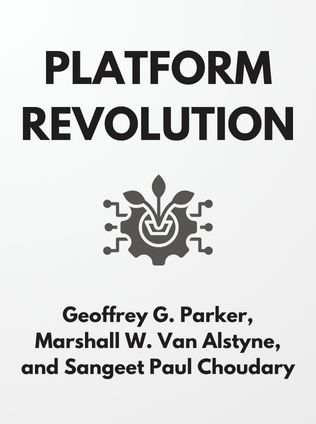
Platform Revolution
How Networked Markets Are Transforming the Economy―and How to Make Them Work for You
By Geoffrey G. Parker, Marshall W. Van Alstyne, and Sangeet Paul Choudary
Published 02/2016
Introduction: The Platform Economy
Platforms have revolutionized the business landscape by facilitating direct interactions between producers and consumers. This shift has enabled platforms to scale rapidly, reduce costs, and create new forms of value. Unlike traditional businesses that operate through a linear pipeline model, platforms create ecosystems that thrive on the contributions of their users.
"Platforms harness the power of the crowd to generate value, transforming the way we do business." - Parker, Van Alstyne, and Choudary
Part 1: The Platform: A Novel Business Model
Pipelines Preceded Platforms
For centuries, businesses followed a linear pipeline model where each step in the production process was controlled by the business. This model was effective in a pre-digital world but is limited by its inability to scale efficiently. Platforms, by contrast, leverage technology to connect users directly, bypassing traditional intermediaries and creating more dynamic and scalable ecosystems.
Platforms Leverage Network Effects
Network effects are central to the success of platforms. As more users join, the value of the platform increases for everyone involved. This positive feedback loop helps platforms grow exponentially and dominate their markets. However, managing network effects requires careful attention to maintain quality and avoid negative impacts such as congestion or decreased service quality.
"The power of platforms lies in their ability to harness network effects, driving growth and increasing value for all participants." - Parker, Van Alstyne, and Choudary
Platforms Outsource Operations
Platforms minimize operational costs by outsourcing production and distribution to their users. This approach not only reduces costs but also allows platforms to scale rapidly. By leveraging the resources and capabilities of their users, platforms can focus on optimizing the user experience and enhancing their core functionalities.
- Airbnb outsources property management to hosts, allowing it to offer a vast array of accommodations without owning any real estate.
- Uber outsources vehicle operations to drivers, providing transportation services without owning a fleet.
Platforms Optimize Connections
One of the key advantages of platforms is their ability to optimize connections between users. Using sophisticated algorithms and data analytics, platforms ensure that users find the most relevant and valuable interactions. This optimization enhances user satisfaction and drives engagement, making the platform more attractive to new users.
- LinkedIn uses data analytics to recommend job opportunities and professional connections that match users' profiles and career goals.
- Amazon's recommendation engine suggests products based on users' browsing and purchasing history, enhancing the shopping experience.
Part 2: Why Platforms Are Transforming the World
Market Dominance and Transformation
Platforms are not only competing with traditional businesses; they are fundamentally transforming entire industries. Their ability to scale quickly, reduce costs, and offer superior value propositions has led to the dominance of platforms in many markets. This transformation is reshaping the economic landscape and creating new opportunities for innovation and growth.
"Platforms are driving a fundamental shift in how businesses operate, enabling unprecedented levels of efficiency and innovation." - Parker, Van Alstyne, and Choudary
Economic, Social, and Political Impacts
The rise of platforms has far-reaching implications beyond the business world. Economically, platforms reduce transaction costs and create new markets, fostering competition and innovation. Socially, platforms enable new forms of interaction and community building, connecting people in ways that were previously impossible. Politically, platforms can disrupt traditional power structures and influence public discourse, raising important questions about data privacy, security, and regulation.
- Economic Impact: Platforms enable more efficient allocation of resources and create new opportunities for value creation.
- Social Impact: Platforms foster new forms of social interaction and collaboration, building communities and connecting people globally.
- Political Impact: Platforms can influence political engagement and activism, but also raise concerns about data privacy and the concentration of power.
"The platform revolution is reshaping not just businesses, but the very fabric of our society and economy." - Parker, Van Alstyne, and Choudary
Sign up for FREE and get access to 1,400+ books summaries.
You May Also Like
Rich Dad Poor Dad
What the Rich Teach Their Kids About Money - That the Poor and Middle Class Do Not!
By Robert T. KiyosakiFreakonomics
A Rogue Economist Explores the Hidden Side of Everything
By Steven D. Levitt and Stephen J. DubnerThe Lean Startup
How Today's Entrepreneurs Use Continuous Innovation to Create Radically Successful Businesses
By Eric RiesWho Moved My Cheese?
An Amazing Way to Deal with Change in Your Work and in Your Life
By Spencer Johnson, M.D.Factfulness
Ten Reasons We're Wrong About the World – and Why Things Are Better Than You Think
By Hans RoslingMake Your Bed
Little Things That Can Change Your Life...And Maybe the World
By William H. McRaven



















